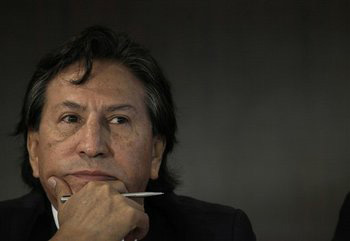
|  |  |  Editorials | Issues | September 2009 Editorials | Issues | September 2009  
Ex-Leaders Say Media Under Threat in Latin America
 Ian James - Associated Press Ian James - Associated Press
go to original
September 19, 2009


| | Peru's former President Alejandro Toledo attends an emergency meeting of the Inter American Press Association in Caracas Friday, Sept. 18, 2009. Toledo and Bolivia's former President Carlos Mesa joined newspaper editors from across the Americas in condemning what they call a series of attempts by Venezuela's President Hugo Chavez to clamp down on the news media. (AP/Ariana Cubillos) |  |
Caracas, Venezuela — Former presidents from Peru and Bolivia joined newspaper editors from across the Americas on Friday in condemning what they call a series of attempts by Venezuelan President Hugo Chavez, and some of his allies, to clamp down on the news media.

Former President Alejandro Toledo of Peru said he is concerned about recent shutdowns of radio stations in Venezuela and a proposed law in Argentina that would break up Clarin, one of Latin America's largest newspaper and cable TV companies.

Toledo likened such actions to "a virus that's expanding" in countries including Bolivia, Ecuador and Nicaragua, and told The Associated Press: "It must be stopped."

Ex-President Carlos Mesa of Bolivia expressed similar concerns at the emergency meeting of the Inter American Press Association in Caracas.

"Everything that restricts freedom of speech is unacceptable," he said.

Enrique Santos, the IAPA's president, said tensions between governments and the press have worsened throughout the Andes and that leaders in Venezuela, Ecuador and Bolivia have created a climate of intimidation with verbal attacks and legal measures aimed at restricting the media. He called it "the Chavez model" and said it has been spreading.

Chavez denies his government is trying to eliminate critical voices in the media, and has been feuding with the IAPA for years.

Chavez did not refer to the latest criticisms in a speech Friday but did say he considers the pending Argentine law, which is designed to prevent media monopolies, "important" and "interesting."

Information Minister Blanca Eekhout rebuffed the press association's concerns saying: "We're never again going to accept the media dictatorship." She defended efforts to step up regulation of the private media, saying "laws must be made to do away with the media dictatorship and allow... the participation of all Venezuelans."

Chavez's government forced 32 radio stations and two small television stations off the air last month, saying some owners had failed to renew their broadcast licenses while other licenses were no longer valid because they had been granted long ago to owners who are now dead.

The government has announced plans to take 29 more radio stations off the airwaves.

Globovision – the last opposition-aligned TV channel on the open airwaves – is also the target of multiple investigations that authorities say could lead to the revocation of its broadcast license.

In one of those cases, prosecutors said Friday they are summoning opposition newspaper editor Rafael Poleo for questioning about a remark he made on Globovision that Chavez could end up "hanging" like Italian dictator Benito Mussolini.

Poleo has left the country and has told colleagues he does not plan to return for now, said David Natera, who heads the Venezuelan Press Bloc, a newspaper industry association.

Poleo, now in Miami, considers the case absurd and believes he would not receive a fair trail, Natera said.

One Globovision reporter has left the country and requested political asylum in the United States, said Alberto Federico Ravell, the channel's director. He did not give details. |

 |
|  |



